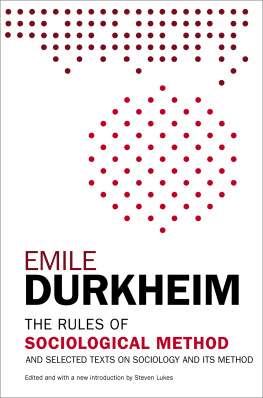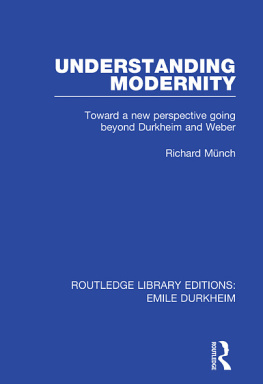Published by
Berghahn Books
www.berghahnbooks.com
2012, 2014 W. Watts Miller
First paperback edition published in 2014
All rights reserved. Except for the quotation of short passages
for the purposes of criticism and review, no part of this book
may be reproduced in any form or by any means, electronic or
mechanical, including photocopying, recording, or any information
storage and retrieval system now known or to be invented,
without written permission of the publisher.
Library of Congress Cataloging-in-Publication Data
Watts Miller, William, 1944-
A Durkheimian quest : solidarity and the sacred / W. Watts Miller.
p. cm.
Includes bibliographical references and index.
ISBN 978-0-85745-549-9 (hardback) ISBN 978-1-78238-528-8 (paperback) ISBN 978-0-85745-567-3 (ebook)
1. Durkheim, mile, 1858-1917. 2. SociologistsFrance. 3. SociologyHistory. 4. EthicsHistory. I. Title.
HM479.D87W37 2012
301.092dc23
British Library Cataloguing in Publication Data
A catalogue record for this book is available from the British Library.
Printed on acid-free paper.
ISBN 978-0-85745-549-9 hardback
ISBN 978-1-78238-528-8 paperback
ISBN 978-0-85745-567-3 ebook
Acknowledgements
Thanks are due, for direct and indispensable support in the evolution of this book, to Marion Berghahn, Bill Pickering and Rob Stones. Thanks are also due, for their own particular contributions to the whole business of a projects floating around, shaping, discussion, critique and encouragement, to Stphane Baciocchi, Massimo Borlandi, Cecilia Busby, Irne Eulriet, Kieran Flanagan, Mike Gane, Sue Stedman Jones, Philippe Steiner and Ed Tiryakian. At the same time, the work would have been impossible without anchorage in the understanding of my partner and wife, Elizabeth Watts Miller.
Along with all the importance of what is owed to individuals, however, there is a collective dimension. A specific debt is to two overlapping groups, one made up of fellow members of the British Centre for Durkheimian Studies, Oxford, the other the network of colleagues, at universities and at the publishers, who help to produce the journal, Durkheimian Studies. Participation in these groups has been an essential stimulus in keeping up to date with new research and as a source and testing-ground of ideas.
A more intangible influence is to do with the career of Durkheim himself, not just during but after his lifetime, in a vast, diverse, long-running and continuing history of interest in his work. How individuals are drawn into these collective currents of interest and select a way through them is to some extent a matter of the biography of individuals themselves. In my own case, at any rate, what is hoped to contribute to a collective effort is also a personal affair.
August 2011
Introduction
An Encyclopaedia Entry
An encyclopaedia entry on Durkheim would not be doing its job, if it just gave his name and dates of birth and death:
Durkheim, Emile (18581917).
It should at least give a reason for having heard of him:
Durkheim, Emile (18581917) One of the founders of sociology.
A detailed entry can then pick and choose its way through various kinds of more or less factual biographical information. For example:
Durkheim, David Emile (18581917) One of the founders of sociology, he was born in eastern France, the son and grandson of rabbis yet nonetheless from a relatively modest social background. Although given the biblical, at the time identifiably Jewish, forename of David, he was known in his family, as also in his public career, simply as Emile Durkheim. He was a firm supporter of the Third Republic, established in the 1870s, was sympathetic with certain forms of socialism, and was often the subject of right-wing antisemitic attacks.
In 1876, aged eighteen, he left his home town of Epinal to become a student at Paris. In 1882, he graduated from the prestigious Ecole Normale Suprieure, and went on to teach in various provincial high schools, where he gave courses on philosophy. In 1885, aged twenty-seven, he published his first academic article, and by this time had already converted to sociology, as well as started his doctoral dissertation on the division of labour. In 1887, he got his first academic appointment as a lecturer at the university of Bordeaux. In 1902, aged forty-four, he returned to Paris with an appointment at the Sorbonne, where he eventually became a full professor and was increasingly active and influential in the universitys affairs. He died while still only in his fifties and at the height of his intellectual powers.
But at this point an encyclopaedia entry runs into problems. As well as listing Durkheims main works, should it not also highlight his most influential ideas? Yet how does the encyclopaedist decide what these are?
It can come down to a report of the views of selected authorities. So in a way, it can come down to the question: whose Durkheim?
But taking another approach, the more basic question is: which Durkheim? This involves a sociology of his representation through the quite different concerns and conventions of an encyclopaedia entry, a student textbook, an examination essay, a chat at a conference break, a fashionable piece on how to develop and apply his insights nowadays, an article in a learned journal on the history of ideas. Accordingly, it is possible to suggest three ideal-types of the character in question a mythological Durkheim, a living Durkheim, and an actual historical Durkheim.
The Mythological Durkheim
Elemental Forms of Sociological Life
If sociologists continue to talk about Marx, Weber and Durkheim, it isnt thanks to an interest in history. It is because they are totems of the tribe. On the surface, they are founding fathers of sociology. At bottom, they are mythic ancestors whose real present-day function is to symbolize a collective identity, constructed and reconstructed in a variety of ways.
These include rites of initiation not least, the examination. New recruits are subject to ordeal by essay, tested for their acquaintance with the tribes special arcane language, and obliged to show they have heard of figures such as Durkheim and can impress their elders with opinions on them.
In general, though, the life of the tribe fluctuates between times of dispersal and times of assembly. In times of dispersal, its scattered members get on with the ordinary everyday business of teaching, research, administration, making a living, and plotting a career. True, throughout these self-interested individualistic times, they may still be linked in the solidarity of a division of labour and of networks of ordinary everyday activities and relations. But what must not be forgotten is the role of collective memory.
Consider, for example, the shelves of sacred texts in a professors office. It is simple-minded to think they are there to be read. A key job is to constitute the professors own particular identity, say with Weber in a place of honour, Durkheim down near the waste-paper basket. But it is above all to act as a constant reminder to students, to colleagues and to the professor of the individuals participation in a collective tribal life, and of authority through relics of the sacred dead among the latest productions of the living.







